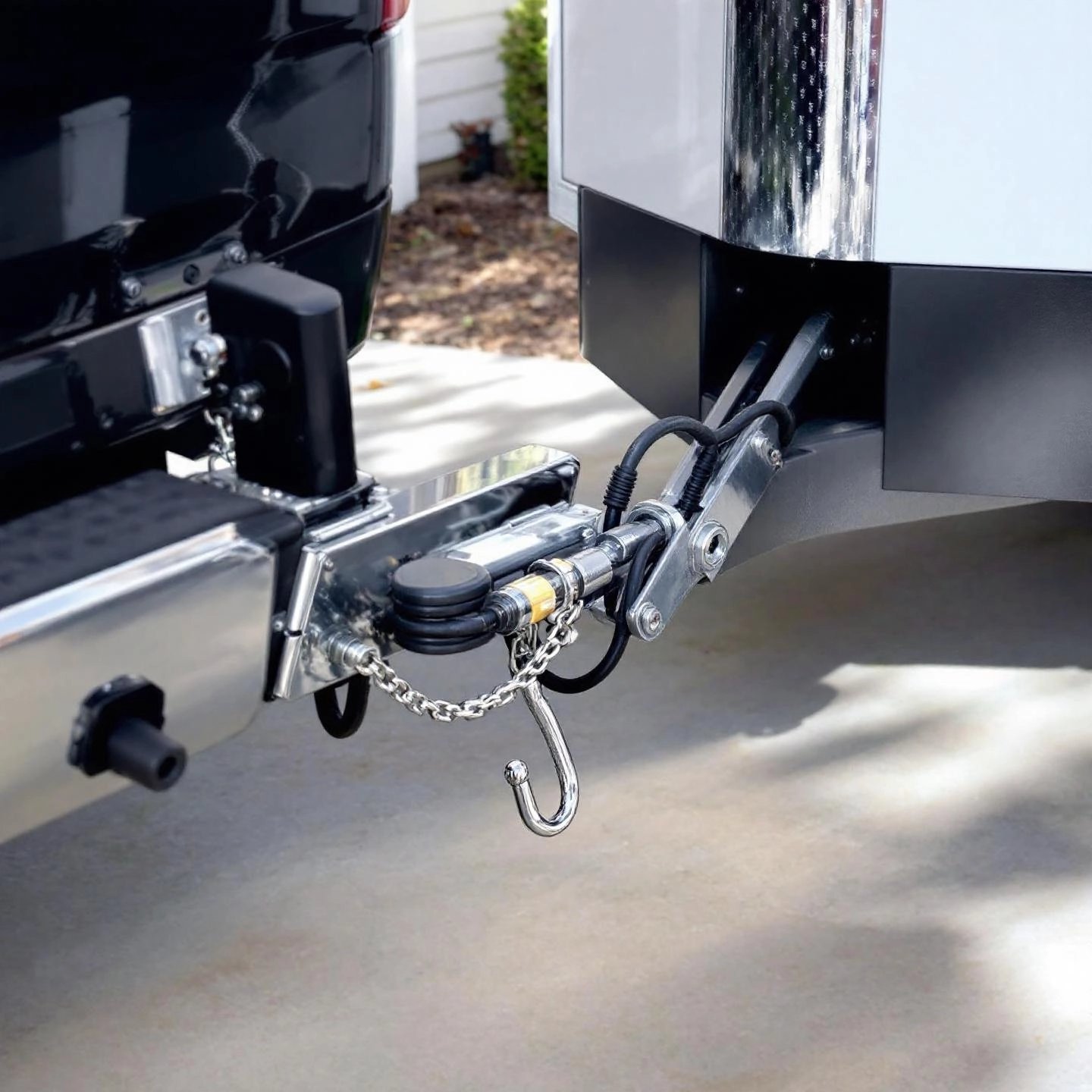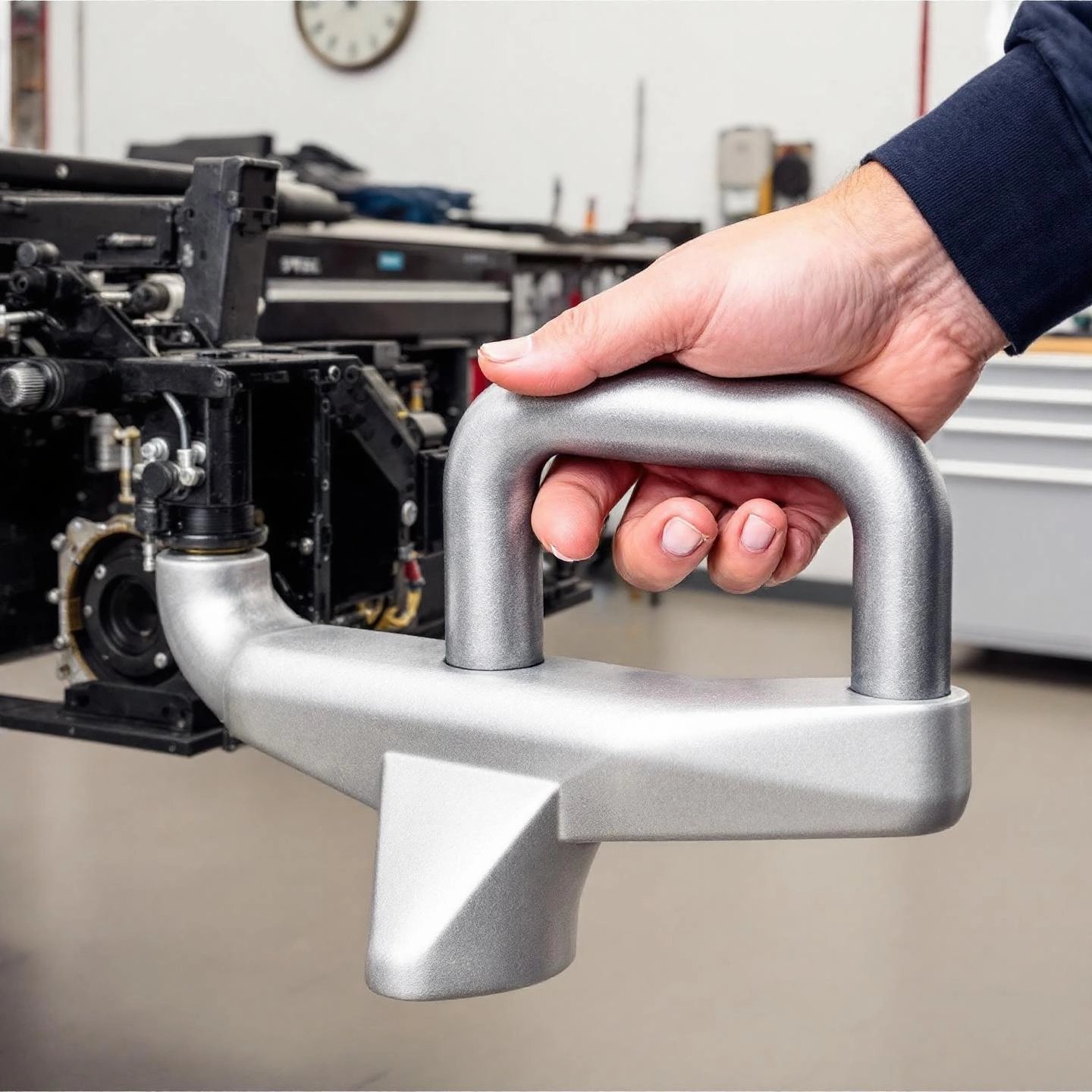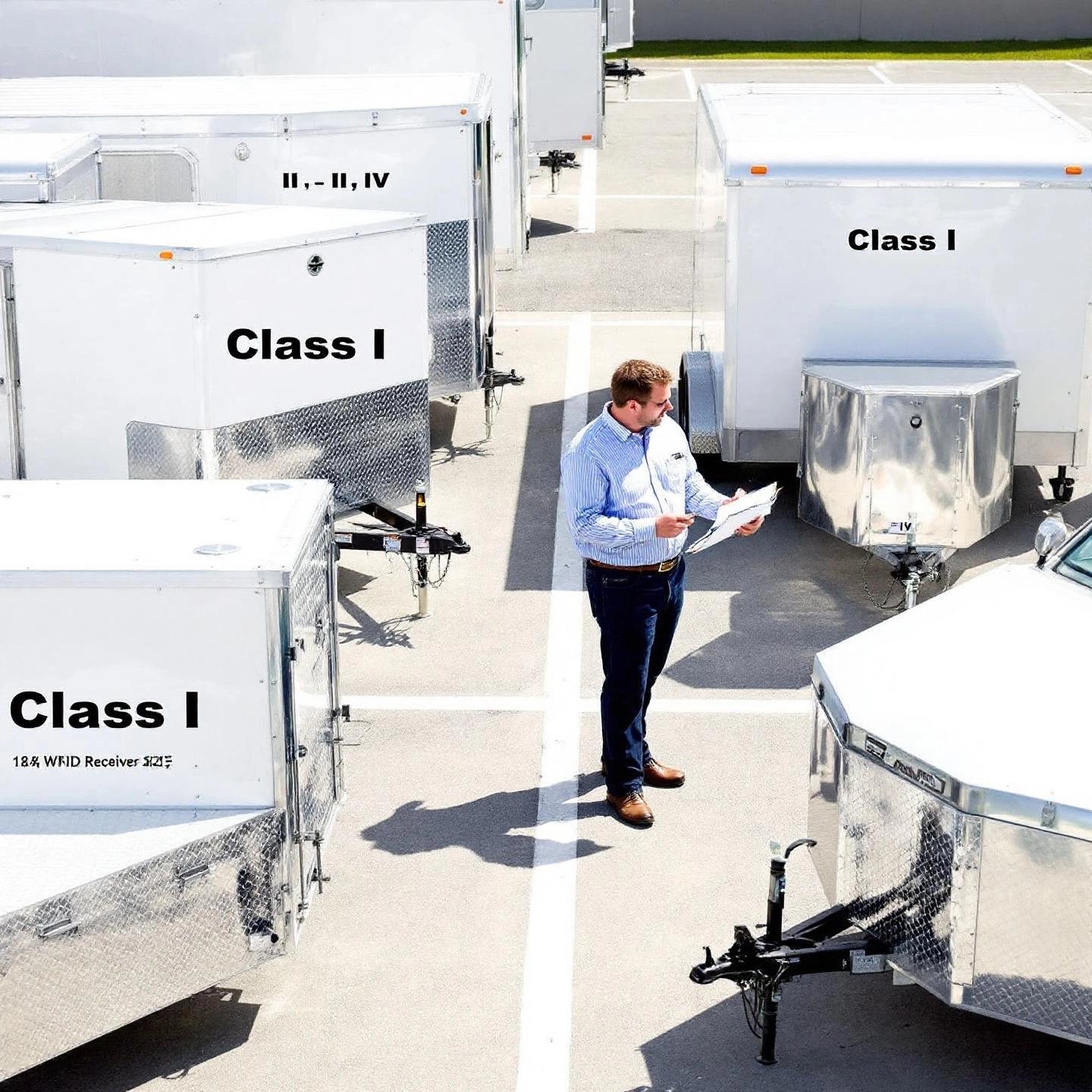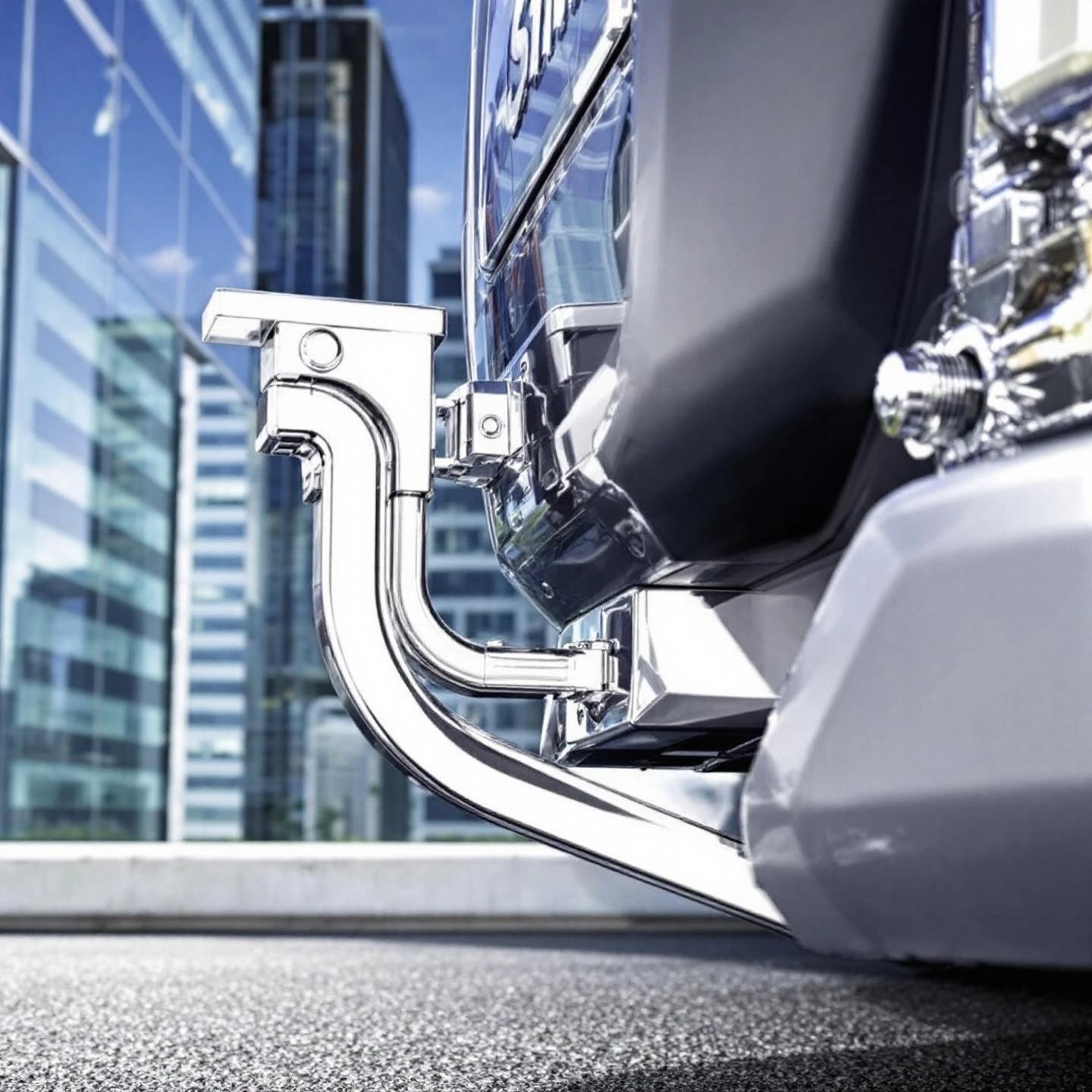
When you think about towing—whether it's a family camper, a boat for weekend adventures, or heavy equipment for work—your hitch is the crucial link between your vehicle and what you haul. For decades, steel dominated this space. But have you ever wondered if there’s a smarter, lighter, and just as reliable option? Enter the aluminum tow hitch: a modern towing solution that’s quickly gaining traction among both seasoned haulers and weekend warriors.
What does a tow hitch actually do? At its core, a tow hitch is the engineered connection point that attaches your trailer, caravan, or other load to your vehicle. It ensures that the forces of acceleration, braking, and turning are safely transferred, keeping both your cargo and your vehicle stable on the road. Traditionally, steel was the go-to material—valued for its strength but often criticized for its weight and susceptibility to rust.
So, why is aluminum now the material of choice for so many towing enthusiasts?
Imagine pulling into your driveway after a long trip and easily removing your hitch without breaking a sweat—or not having to worry about ugly rust stains after a rainy season. That’s the kind of upgrade aluminum brings to today’s towing setups. As material technology continues to advance, more drivers are discovering that an aluminum tow hitch isn’t just a trend—it’s a thoughtful evolution that brings together performance, durability, and user-friendly design. If you’re considering a switch or setting up your first trailer, aluminum offers a compelling balance of safety and convenience that’s hard to beat.

When you’re standing in your garage, staring down a heavy steel hitch, have you ever wished for something easier to handle? Or maybe you’ve noticed rust creeping in after just one winter season. If these scenarios sound familiar, it’s time to look at why a lightweight aluminum hitch is quickly becoming the go-to choice for modern towing.
Imagine lifting your hitch with one hand or installing it without breaking a sweat. That’s the everyday reality for those who’ve made the switch to aluminum. But the benefits go far beyond just weight savings. Let’s break down what makes aluminum stand out:
Picture yourself prepping for a camping trip or a day at the lake. With an aluminum hitch, you won’t dread the installation process—no more wrestling with a cumbersome steel mount. And when the weather turns wet or salty, you can trust your hitch to resist the elements, maintaining its strength and appearance over time.
For anyone who values convenience, longevity, and ease of use, aluminum offers clear advantages. The user experience is simply more enjoyable—less hassle, less worry, and more confidence in your towing equipment.
As you weigh your options, remember that these core benefits aren’t just about convenience—they’re about making every towing experience safer, smoother, and more reliable. Next, we’ll address common myths about aluminum’s strength and show how today’s engineering ensures you never have to compromise on durability.
When you hear “aluminum,” do you picture soda cans or lightweight ladders? If so, you might wonder how aluminum could possibly stand up to the rigors of towing thousands of pounds. It’s a common concern—does an aluminum tow hitch really have the muscle to match its steel counterpart? Let’s break down the facts and clear up the confusion.
Not all aluminum is created equal. The secret behind a strong aluminum hitch lies in advanced engineering and the use of specialized alloys. Imagine the difference between a basic aluminum foil and the high-strength metal used in airplanes. Most high-quality hitches are crafted from aircraft grade aluminum—specifically alloys like 6061-T6 or 6061-T6511—which are renowned for their exceptional strength-to-weight ratio. These are the same materials trusted in aerospace, where failure is not an option.
Still skeptical? Consider the rigorous safety standards that every reputable hitch must meet. For example, the SAE J684 standard—recognized across the towing industry—sets strict requirements for impact resistance, fatigue, and overall performance. Both steel and aluminum hitches undergo these tests, simulating years of real-world towing, including sudden stops, bumpy roads, and heavy loads.
One forum user summed it up well: “The biggest thing is getting over the whole it’s aluminum, it must be weaker mentality and spend a little more for an American-made piece. After all, they are V-5 and SAE-J684 certified and tested.” The numbers don’t lie—when you choose a quality, certified aluminum hitch, you’re not sacrificing strength for weight savings.
How does this translate to everyday use? Many drivers report that their aluminum hitch strength matches or exceeds expectations. The key is choosing a well-engineered product, manufactured to exacting standards. While steel is denser and harder, modern aluminum alloys are specifically selected and treated for high-load, high-cycle applications. And, thanks to their corrosion resistance, aluminum hitches maintain their integrity and appearance over time—no worries about rust weakening the connection.
In short, if you’ve hesitated because of old assumptions, rest assured: today’s aircraft-grade aluminum hitches are up to the task, providing both the brawn and reliability you need for safe, confident towing. Next, we’ll explore how to select the right hitch for your vehicle and trailer, ensuring you get the perfect fit for your towing adventures.

Ever stood in the aisle of a hardware store, staring at a wall of hitches and feeling lost? Or maybe you’ve wondered if your current setup is truly safe for that cross-country trip. Selecting the best aluminum tow hitch isn’t just about grabbing the shiniest option—it’s about understanding your unique towing needs and making sure every component works together for a smooth, secure ride.
Sounds complex? It’s easier than you think. Every towing setup comes down to two critical numbers:
Why do these numbers matter? Your hitch, ball mount, and receiver must all be rated to handle both your GTW and TW. If any part falls short, you risk unsafe towing and equipment failure.
Not all hitches are created equal. Choosing the right class ensures your setup can safely handle your trailer’s weight. Here’s a quick reference table to help you compare:
| Hitch Class | Receiver Size | GTW Limit | TW Limit | Best For |
|---|---|---|---|---|
| Class I | 1-1/4" | Up to 2,000 lbs | Up to 200 lbs | Small utility trailers, bike racks |
| Class II | 1-1/4" | Up to 3,500 lbs | Up to 350 lbs | Medium trailers, small boats |
| Class III | 2" | Up to 6,000 lbs | Up to 600 lbs | Campers, small RVs, boats |
| Class IV | 2" | Up to 10,000 lbs | Up to 1,000 lbs | Large trailers, heavy loads |
| Class V | 2.5" | Up to 17,000 lbs | Up to 1,700 lbs | Commercial, multi-axle trailers |
Always confirm your receiver size and class before purchasing—don’t just eyeball it! A quick measurement and check of your vehicle’s manual can save you from costly mistakes.
Now that you know your weight ratings, it’s time to pick between a fixed or adjustable aluminum hitch. Here’s how to decide:
Imagine towing a boat one weekend and a camper the next—an adjustable hitch means no more wrestling with multiple ball mounts or worrying about mismatched heights. For many, this flexibility is the difference between a stressful setup and a seamless towing experience.
If you’re looking for a solution that checks all the boxes for strength, versatility, and ease of use, consider the Shengxin Aluminum Adjustable Trailer Hitch. Engineered from high-grade, rust-proof aircraft aluminum, it features a CNC-machined adjustable drop/rise system and a dual-ball mount for both 2-inch and 2-5/16-inch couplers. This means you can tow a wider range of trailers with a single, lightweight hitch—no more swapping hardware or worrying about corrosion. It’s a smart choice for anyone seeking a truly adaptable, long-lasting towing setup.
Once you’ve matched your needs to the right hitch, you’ll tow with greater confidence and less hassle. Next, we’ll walk through the step-by-step process of installing your new aluminum hitch and performing essential safety checks, so you’re ready to hit the road worry-free.
Ready to put your new hitch to work? If you’ve never installed an aluminum tow hitch before, you might wonder: “Is it complicated?” Not at all! With a few simple steps—and some crucial safety checks—you’ll be ready to tow with confidence. Let’s break down the process so you can get on the road quickly and safely.
Imagine you’re prepping for a weekend getaway or hauling gear for a big project. The last thing you want is confusion at the hitch. Here’s a straightforward, step-by-step guide to make aluminum hitch installation a breeze:
At this point, your aluminum tow hitch is installed—but before you hit the road, it’s time for some essential tow hitch safety checks.
Even the best hitch installation won’t keep you safe if the rest of your towing setup isn’t in top shape. Here’s what to check before every trip:
Tip: Make it a habit to run through this checklist before every tow, not just the first time. Consistency is key for safe, stress-free hauling.
With your aluminum hitch installation complete and all tow hitch safety checks performed, you’re ready for a smooth journey. Next, let’s cover how to keep your hitch looking and performing like new with simple maintenance tips.
Ever wondered how some hitches keep their shine and strength, year after year, while others quickly show signs of rust and wear? The secret isn’t complicated—it’s all about consistent, straightforward aluminum hitch maintenance. Whether you tow every weekend or only on special occasions, a few simple routines can keep your rust-proof trailer hitch performing and looking like new.
Imagine heading out for a big trip, only to discover your hitch is stuck, corroded, or worse—unsafe. Regular care not only extends the life of your hitch but also protects your safety and your vehicle’s value. Aluminum hitches, especially those made from high-grade alloys, are naturally resistant to rust, but routine upkeep ensures they stay at peak performance no matter the conditions.
| Task | Frequency | How-To |
|---|---|---|
| Inspect for Wear & Damage | Before every tow & monthly during heavy use | Check for cracks, bends, or loose hardware. Pay special attention to moving parts and pins. Replace any damaged components immediately. |
| Clean Thoroughly | After each trip or monthly | Use a wire brush to remove debris, then wash with mild soap and warm water. Rinse and dry completely with a microfiber towel to prevent moisture buildup. |
| Remove Rust or Corrosion | As needed | If you spot any rust (rare with aluminum, but possible on steel hardware), treat with a rust remover or a vinegar-baking soda mix. Scrub gently and re-clean the area. |
| Lubricate Moving Parts | Every 1–2 months or before extended storage | Apply a high-quality, waterproof grease to the hitch ball, adjustable drop/rise mechanisms, and locking pins. Use a dry lubricant for lock cylinders to avoid attracting dust. |
| Store Properly | When not in use | Remove the hitch from your vehicle and store it in a dry, covered location. Use a hitch cover to shield from dust and moisture if left installed. |
One of the biggest perks of choosing a high-quality aluminum hitch—like the Shengxin Aluminum Adjustable Trailer Hitch—is just how little maintenance is needed. Thanks to its robust, rust-proof construction and precision machining, there’s no need for constant repainting or elaborate treatments. A quick inspection and basic cleaning are usually all it takes to keep it in top form, even after exposure to rain, salt, or mud.
Think about it: with just a few minutes of care, you’ll avoid the headaches of stuck pins, seized mechanisms, or unsightly corrosion. Plus, maintaining your hitch means you’re always ready for your next adventure—no last-minute surprises or delays.
Next, let’s take a closer look at how an aluminum hitch doesn’t just excel in performance, but also enhances the visual appeal of your vehicle, adding a polished, modern touch to your towing setup.

When you picture a tow hitch, do you imagine a bulky, rusted chunk of metal hanging from the back of your vehicle? Now, imagine something entirely different—a polished aluminum hitch that not only performs but also turns heads every time you back up to your trailer. The visual appeal of aluminum hitches is more than just a bonus; it’s a clear reflection of modern design and thoughtful engineering.
Ever noticed how a clean, shiny hitch instantly upgrades a truck or SUV’s look? Aluminum hitches feature a bold, machined finish that stays bright and clean with minimal effort. Unlike steel, which often needs thick coatings to stave off rust, aluminum’s natural corrosion resistance means its surface remains free from rust and discoloration—even after years of use in rain, snow, or salty environments. The result? A stylish tow hitch that maintains its luster and complements the lines of any modern vehicle.
It’s not just about looks. A well-maintained aluminum hitch signals that you care about both performance and presentation. For those who use their vehicles for business, recreation, or simply take pride in their ride, a stylish tow hitch can make a strong impression. Imagine pulling up to a job site, boat launch, or family event—your hitch is as clean and modern as the rest of your truck, adding a subtle touch of professionalism or personal flair.
And the benefits aren’t just skin-deep. Because aluminum doesn’t rust, there’s no risk of unsightly stains dripping onto your driveway or bumper. Your entire towing setup stays cleaner, sharper, and more inviting—trip after trip.
As you can see, the right aluminum hitch offers much more than just towing power. It’s a finishing touch that elevates your vehicle’s appearance and makes every adventure a little more stylish. Next, we'll wrap up by summarizing the key benefits and guiding you toward the smartest choice for modern towing.
When you reflect on what matters most in your towing setup—safety, simplicity, and long-term value—does your current hitch truly deliver? Imagine a solution that not only makes every hookup easier, but also stands up to years of demanding use without rusting, bending, or losing its shine. That’s the promise of a modern aluminum tow hitch, and it’s why so many drivers are making the switch.
Let’s recap the standout aluminum tow hitch benefits that set these hitches apart from traditional options:
For most drivers—whether you tow a boat, a camper, or work equipment—an aluminum hitch delivers the ideal combination of strength, longevity, and ease of use. It’s a genuine upgrade in every sense: lighter to handle, tougher against the elements, and designed to look as good as it performs. No more compromises or trade-offs—just a smarter, more enjoyable towing experience.
If you’re ready to experience these advantages firsthand, consider a proven option like the Shengxin Aluminum Adjustable Trailer Hitch. Built from high-grade, rust-proof aluminum and engineered for versatility, it adapts to a wide range of vehicles and trailers, making it the perfect companion for all your towing adventures. Its adjustable design ensures a level, stable tow—no matter what you’re hauling.
Choosing the right modern towing equipment can transform your time on the road. Explore reputable brands, match your hitch to your needs, and enjoy the confidence that comes from using equipment designed for today’s challenges. With an aluminum tow hitch, you’re not just investing in a piece of hardware—you’re unlocking a safer, simpler, and more stylish towing future.
Aluminum tow hitches offer significant advantages: they are much lighter, making installation and removal easier, and they naturally resist rust and corrosion, ensuring long-term durability. Their modern design also adds a stylish touch to your vehicle, and advanced alloys provide strength comparable to steel hitches.
Yes, high-quality aluminum tow hitches made from aircraft-grade alloys are engineered for exceptional strength and undergo rigorous testing. Many models are rated for towing capacities that match or exceed those of steel hitches, making them reliable for demanding towing tasks.
Start by checking your trailer's Gross Trailer Weight (GTW) and Tongue Weight (TW). Match these numbers to a hitch rated for your needs, confirm your vehicle's receiver size and class, and consider whether a fixed or adjustable hitch suits your towing habits. Adjustable models, like Shengxin's, offer versatility for multiple trailer types.
Aluminum tow hitches require minimal upkeep. Regularly inspect for wear, clean with soap and water after use, lubricate moving parts if adjustable, and store in a dry place when not in use. Their rust-proof nature reduces the need for intensive maintenance.
Shengxin's hitch is crafted from high-grade, rust-proof aircraft aluminum and features a CNC-machined adjustable system for precise leveling. Its dual-ball mount accommodates different trailer types, making it a versatile, durable, and convenient choice for safe, stable towing.
 un service en ligne
un service en ligne 0086 136 3563 2360
0086 136 3563 2360 sales@sxalu.com
sales@sxalu.com +86 136 3563 2360
+86 136 3563 2360